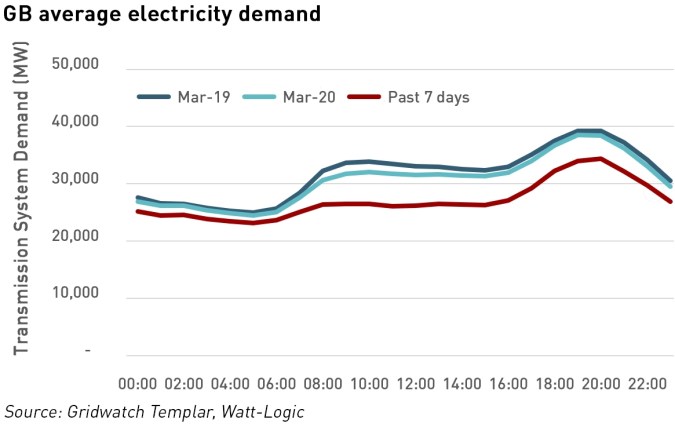As we all enter the second week of the covid-19 lockdown, what is the impact of the crisis on the gas and electricity sectors?
Retail markets: changing usage patterns and an increase in consumer vulnerability
More consumers are now vulnerable
One of the more urgent aspects of the crisis is for suppliers to manage the increase in the population of vulnerable consumers – people who would not in normal circumstances necessarily be considered vulnerable are becoming vulnerable due to the need to self-isolate for up to three months. In addition, many more consumers may be pushed into financial difficulties, which will hit them from two directions: loss of income and higher utility bills as people are at home where otherwise they would have been at work.
Suppliers will need to be particularly mindful of the approximately 4.3 million customers on prepayment meters who need to purchase top-up cards but who may not be able to leave the house if they are in the groups which are advised to shield themselves from potential exposure to the virus. Most suppliers have information on their websites advising consumers to ask friends or family to drop off new prepayment cards for them, and have helplines available for those unable to do this, through which they can arrange for new cards, with additional credit pre-loaded, to be posted to them.
Ofgem is advising:
If you or someone you know is vulnerable, of pensionable age, has children under 5, a disability or long-term medical condition it’s important to let your energy supplier know. Each energy supplier keeps a Priority Services Register of people who may need additional assistance. It’s free to be added to the list.
Contact the Citizens Advice Helpline if you need additional help with an energy problem. Go to Citizensadvice.org.uk/energy or call them on 0808 223 1133. Calls are free. If you need more support if you feel overwhelmed, or are unable to deal with your supplier on your own because of personal circumstances, the Citizens Advice Helpline may also be able to refer you to their Extra Help Unit. Learn more at: https://ehu.org.uk.
The key here is that those affected know help is available. The Government has already shown its willingness to use mobile phone networks and the postal system as well as traditional and social media in order to communicate with the population. It should ensure that vulnerable people know help is available even if they might feel unable to help themselves, for example due to mental health challenges.
Suppliers also have a role to play in this – they should seek to monitor customer activity to identify any households whose consumption has declined significantly. This may be difficult in the absence of smart meters, but efforts should be made to identify customers that have self-disconnected to ensure they have the help they need. Welfare checks can be requested from the police.
Covid-19 will make life harder for suppliers: some may fail
On the other side of this are the suppliers. As I have described before, energy supply is not a high margin business, and small suppliers in particular have been struggling – nine ceased trading in 2019, and so far this year, another two – Gnergy and Better Energy – have closed. Others, such as Nottingham Council owned Robin Hood Energy, are looking vulnerable.
In early March, before the corona virus crisis hit, five suppliers were banned from taking on new customers after failing to enrol in the smart meter infrastructure (the Data Communications Company which enables communication between smart meters, suppliers and network companies). With both domestic and business customers likely to struggle to pay their bills during this crisis – and anecdotally, SMEs and households are cancelling their direct debits to suppliers – small suppliers in particular will likely face liquidity constraints. The government is being urged to support suppliers to avoid debt contagion.
Small suppliers are now faced with further existential challenges – staffing issues may arise as employees may become unwell, or be forced to self-isolate themselves. While the Government is making a raft of measures available to support small businesses through the crisis, lack of staff may hamper their ability to take advantage of these, and many of these companies already struggle to meet their everyday regulatory obligations with respect to the Renewables Obligation, Capacity Market and smart meter rollout.
Network operators put existing pandemic procedures into play
Network operatators and large generators at risk of critical staff absence
Providers of critical infrastructure have established and tested procedures in place to manage the impact of disasters such as pandemics, so it is to be hoped that the ability of the gas and electricity networks to continue to operate safely and effectively will not be affected, although the press is reporting today that several DNOs are warning about the potential for power cuts and blackouts. National Grid, DNOs and major generators have barred all non-essential staff from entering their facilities to avoid an outbreak among its most critical teams, and in some cases, accommodation is being provided to allow staff to stay on-site, avoiding the need to travel and be potentially exposed to the virus.
“We have well-developed procedures in place to manage the effects of a pandemic and have analysed anticipated effects on electricity supply and demand of mass self-isolation of the UK’s workforce. In fact, demand across the country is expected to reduce; largely owing to a decrease in energy use from industrial consumers, which is likely to be greater than the increase in domestic demand as people stay at home,”
– Fintan Slye, director, National Grid ESO
Privately I have heard concerns that power station operation might be hampered due to lack of available staff – a concern also for network companies that are now only carrying out emergency repair work. If these concerns are realised, then the industry will look to National Grid and Ofgem to facilitate co-operation between market participants to ensure power stations and networks are able to continue operating. This would potentially require suspension of certain competition-related regulations to allow companies to co-operate without being accused of cartel-like behaviours, and the regulator would have the responsibility to ensure customers were not disadvantaged by the resulting potential for market abuse.
Overall, consumers would be more disadvantaged by blackouts, so the focus should be on security of supply ahead of affordability, with the threat of fines after the crisis has passed to deter any profiteering. De-carbonisation should be de-prioritised in the current crisis since higher emissions over a period of weeks or months would have a lower adverse impact than supply disruptions, not least because with intensive care units running at capacity this would be a bad time to have to reply on potentially flaky on-site back-up generation.
Demand falling as businesses forced to close by covid-19 legislation

The lockdown is changing energy usage across the country. Many businesses have closed, while others are ramping up or adapting to deliver new products or services. One of the largest shifts is in the rapid increase in home-working, although this is impacting broadband networks more than energy networks, and the increase in domestic demand will be more than offset by the fall in industrial and commercial demand as heavy industry for the most part shut down. Typical weekend demand patterns are likely to provide the best models for consumption during the lockdown.
According to research by Octopus Energy, up to 30% of UK households changed their usage patterns in the week beginning 16 March, before the lockdown came into force. Smart meter data from 115,000 households indicated that households had increased their daytime energy use by 2-4%, raising electricity bills by between £1.34 and £2.85 per week on average.
“Demand would usually decline at this time of year anyway, complicating comparisons across the month of March, but the shape of consumption has changed – the morning rise in demand has been dampened, and as the sun has emerged this week, midday demand has decreased even more. This means that the ramp into the evening peak is exacerbated, although there appears to be sufficient flexible generation to manage it at the moment, and the clock change typically brings a reduction in peak evening demand,”
– Jon Ferris, strategy director, Electron
As we move into Spring, solar generation and milder weather will start to push network demand lower. If industrial demand continues to be low, renewable generation might be constrained in order to ensure grid stability. Ofgem should allow National Grid to focus on maintaining frequency control in the most technically reliable way, rather than the lowest cost way. I am not generally a fan of coal power, but it might be sensible to keep the country’s three remaining coal stations running (coal stocks allowing) in order to maintain baseload supply during the crisis. The increased emissions in any case would be offset by lower emissions from industry and transport.
.
Without doubt, the covid-19 crisis is proving challenging for the energy sector, and Ofgem needs to be proactive to ensure security of supply is prioritised, and to ensure Suppliers of Last Resort are lined up to ensure continuity for consumers in the event of supplier failures. Some measures should be put in place to support suppliers, but caution is needed not to support business that are marginal in normal times.
.
I will be taking part in a panel discussion hosted by Energy Live News on Friday 3 April to discuss the impact of covid-19 on users, brokers and suppliers.
.
.
Please contact me on kathryn.porter@watt-logic.com if you need support in applying for small business grants, extending your credit facilities or engaging with suppliers or large consumers to re-structure supply agreements in these unprecedented times.







Leave A Comment